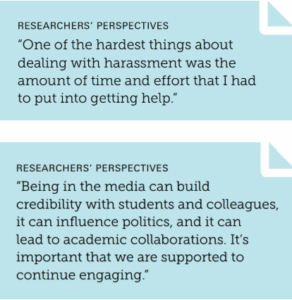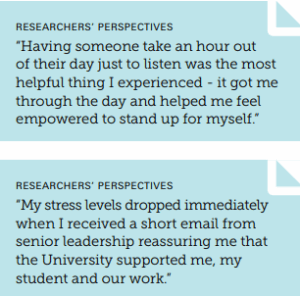New resources to help universities protect researchers from online harm are now available from the New Zealand Science Media Centre, thanks to support from Universities New Zealand.
While guidance exists to help individual researchers navigate harassment, there has been little practical advice outlining steps their organisations can take to support them. These new materials aim to fill that gap, with a focus on building clear systems before incidents happen, and responding effectively when they do.
“The message we have heard over and over from researchers who have experienced online abuse is that having their institution’s backing is key to reducing harm, “ said Dacia Herbulock, Director of the NZ Science Media Centre.
“Knowing their organisation will support them and knowing how to access that support when they need it makes all the difference.”

Universities New Zealand Chief Executive Chris Whelan welcomed this new guidance. “The public benefits when academics bring their expertise and knowledge to debate on matters of public interest. For academics to put themselves out there they need to be safe from behaviours that cross the line from free and frank exchange of ideas into harassment or threats. This guidance will help with this.”
Over the past eight months, staff in IT, Communications, Human Resources and other departments across different universities have shared their experiences with the Science Media Centre and with each other, providing advice to shape the new resources to ensure they’re practical and fit-for-purpose.
The open, constructive dialogue within this reference group led to the creation of resources that serve universities just starting to develop processes to support their researchers, as well as those with more established systems.
The Science Media Centre also conducted in-depth interviews with researchers who have experienced harassment to incorporate their feedback. We asked them what aspects of their research organisations’ response were most helpful, and where are the gaps that need to be addressed.
Finally, we’ve liaised with academics researching this topic in the United States and New Zealand to ensure the new resources are guided by evidence and emerging best practice.
The Science Media Centre thanks all the researchers who shared their personal stories, preliminary research, and other work to help us craft these documents.
“We’re really proud of this work and hope it will inspire research organisations around the world to learn from each others’ experiences. Our goal is for researchers who are targeted for online abuse and harassment to have straightforward and consistent access to effective support from the organisations they represent,” said Dacia Herbulock, Director of the Science Media Centre NZ.
“It’s a hard problem to solve individually, but we hope this contribution will help provide some momentum and useful guidance on the way forward.”

Editor’s note:
The resources include:
▸ Guidance for research organisations
▸ Advice for staff supporting researchers facing harassment
▸ Checklist for staff receiving reports of online abuse
We will be launching these new resources with a webinar on Friday 27 June, 1pm NZST.
This webinar is intended for leadership at research organisations, and staff who may have to assist researchers facing harassment.
Registration link here.
Universities contributing to the project are:
- Waipapa Taumata Rau, University of Auckland
- AUT
- The University of Waikato
- Massey University
- Te Herenga Waka – Victoria University of Wellington
- University of Canterbury
- University of Otago – Ōtākou Whakaihu Waka
Resources for researchers have been developed by our colleagues at the Australian Science Media Centre, and are available to New Zealand University staff via the SCIENCE MEDIA SAVVY training portal, thanks to support from Universities New Zealand.
